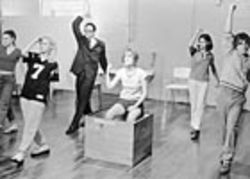
- Art in America February 1998
- The New York Times October 26, 1998
- Die Welt September 10, 1998
- Die Welt September 10, 1998
- taz September 10, 1998
- taz September 10, 1998
Zombie Aerobics
by Michael Feingold
[text about Footloose]
The seven actors in Elevator Repair Service’s Total Fictional Lie, who break into dance almost as often as the kids in Footloose, don’t have to fake up any Broadway pseudo-excitement over their material: They’ve been down the road to hell with this society and aren’t making any bones about it. Their first big number is a near-parody of Footloose‘s aerobic frenzies, set to a piece of ’50s lounge-act bop, which they endure with the resentful glare of zombies who are inexplicably testy about being roused from eternal sleep. After a good dose of Uptown hype, the negative attitude is sharp and refreshing. Some of the comic freshness in it wears off as the piece moves on, but the intelligence behind it, and the skill with which it’s carried out, keep their hold on you.
Hype of various kinds is in fact Total Fictional Lie‘s subject. The text is a set of cunningly deployed, mix-and-match snippets from various documentary films, so that we hear teen pop star Paul Anka’s manipulators, an anonymous Bible salesman, and the multiple murderer Aileen Wuornos all mouthing off—sometimes in counterpoint—about whatever particular piece of b.s. they’re trying to sell us. Between and among these verbal manipulations of others come physical manipulations: At the opening, Paul (tiny, darkly glowering Susie Sokol) emerges feet first from a wooden box; at various points two and then three of the cast’s five females crowd their way into the crate and out again until Paul’s finally forced back in at play’s end. That it’s women—except in “Paul” ‘s case—who manipulate themselves and each other into the box, often while the two men look on noncommittally, is a resonant point the group delicately leaves untouched by comment. The self-punishment performers (particularly dancers) go through for their art stands in for the internalized self-punishment of groups society classes as inferior.
As its attitude would suggest, Elevator Repair Service isn’t always forthcoming about its substance. ERS’s standard tactic is dry, unemphatic comment, its principal target—the pervasive phoniness of the social structure we inhabit—both slightly facile and rather nebulous. The troupe could reach more daringly far, and grasp more fiercely, without losing its seemingly irrefragable cool. I know it could because its work here, under codirectors John Collins and Steve Bodow, has integrity, intelligence, and precision as well as imaginative skill; and its actors, especially Sokol and Rinne Groff, have talent for days. If that sounds like hype, try the trip from 46th and Broadway to 9th Street and First Avenue yourself. The minds are sharper, and the feet distinctly looser, Downtown.